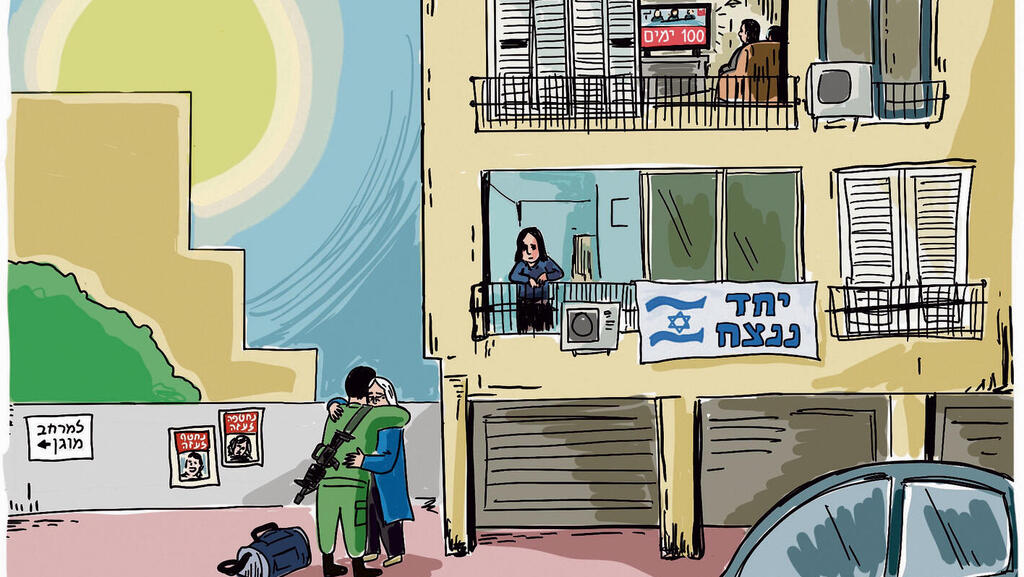Getting your Trinity Audio player ready...
Two hopes away from the battle I saw peace.
My weary head must go on, my feet were in a dream.
The burned man said: I am the bush that burned and was
consumed. You may draw near.
Keep your shoes on your feet, this is the place. (Yehuda Amichai)
To get up in the morning. To open the eyes. To reach for the phone. To enter the news website. To skim through the names of the casualties. The eyes pass over the faces of the names. The heart pounds hard. A quick first read, ensuring there's no one among the casualties I know. The tally so far, in three months of war: the son of a good friend. The son of a student. The brother of a friend of my daughter.
Read more:
This morning there's no familiar name. So now, a second, slower read. To honor the fallen. Who did we lose last night? Which young lives were cut short? They always look in pictures like children in soldier costumes. Then, to get up from the bed. To force yourself to get up from the bed even though the body is heavy. It pulls downward, toward despair.
To put on sweatpants. To go outside, to start running. I never understood this running thing. It's not pleasant in the body. There's no plot. There's no ball. I used to look at men my age running and think there were better ways to solve the midlife crisis. Since the war began, I run. Every morning. I decided I would run until it ended. Like Forrest Gump. There's no choice. You can't start the day with all this grief in your throat. You need something to balance. Something to inject a bit of hope into your blood.
The streets are empty at such an early hour. Everywhere, on trees, on building facades, in squares, pictures of captives are hanging. I pass by the photos. Slowly. Some are still there in some tunnel. Some of them will never return. And some have returned, in the only good week in these hundred days, where there was good news: a child running to hug his father who spread his arms toward him. A grandmother reunited with her granddaughter. Good Israelis stood on the sides of the roads at night, waving flags to express solidarity.
In general, if there's anything inspiring hope in the last hundred days, it's the Israeli spirit that has resurfaced.
Hamas attempted to break it on October 7. This is evident. The fact that the acts of rape, murder, beheading and abuse were documented and circulated as videos on social media indicates a premeditated psychological warfare. To our pride, the opposite of what Hamas planned has happened. The cruelty of October 7 awakened Israelis rightfully to memories of the Holocaust and the pogroms that preceded it. Instead of breaking, we united and stood tall, realizing we had nowhere else to go. This is our land, and we'll have to fight for its existence.
Protest organizations redirected their energy and activism to support the soldiers. The enlistment rate for reserves exceeded 100%. People over the age of conscription volunteered to serve on the borders. Israelis living abroad returned to join the effort.
The various sectors comprising our society, which stood on both sides of a very tense debate over the judicial system before the war, are now fighting together, shoulder to shoulder. In the north and south. In encounters with soldiers ('Perhaps you'd like to read our story?' one of them messaged me on Facebook. So I came. And since then, I've been trying to come again), I am impressed that they are tired, worried, but surprisingly optimistic. When I wonder about the source of their optimism, they talk about their unity and even use the word "repair." They argue that, in this period, there is potential for internal mending among us.
And there is much to fix. Much was corrupted and shattered.
I am also drawing from the past in these dark days to draw hope from it. The memory of my first childhood is from the Yom Kippur War. In fact, in the months following Yom Kippur, my mom was on the bed, playing the flute. There are other women in the house. Friends of my mom. I listen to the sound of the flute. My dad is not around. He's in the reserves. He remained in the reserves as a psychologist for months after the war. Dealing with combat traumas. Post-traumatic experiences hovered in our house, and also on the street, and were part of my childhood.
The entire country was in a post-traumatic state after Yom Kippur, but we moved on. A few years later, a peace agreement was signed with Egypt (a short mental exercise to understand how significant this agreement is: imagine these days without peace with Egypt).
And that is the greatest hope. I handle it cautiously. Afraid to nurture it. After all, the word "peace" hasn't been spoken here for years. It seems like it's out of use. And, in general, it's very difficult to see the horizon when you're in the trenches.
But maybe, just maybe, that dreadful Saturday will make us stop suppressing it. Stop being addicted to the illusion that we can "manage the conflict" with the Palestinians by buying time. This conflict needs to be solved. Especially in the current crisis, after Hamas is neutralized, there may be an opportunity to think differently. To imagine together with the international community solutions that haven't been tried yet, to put an end to this cycle of bloodshed. And to ensure that we can thrive here without being confined to checkpoints as a way of life.
That would be the true image of victory.


